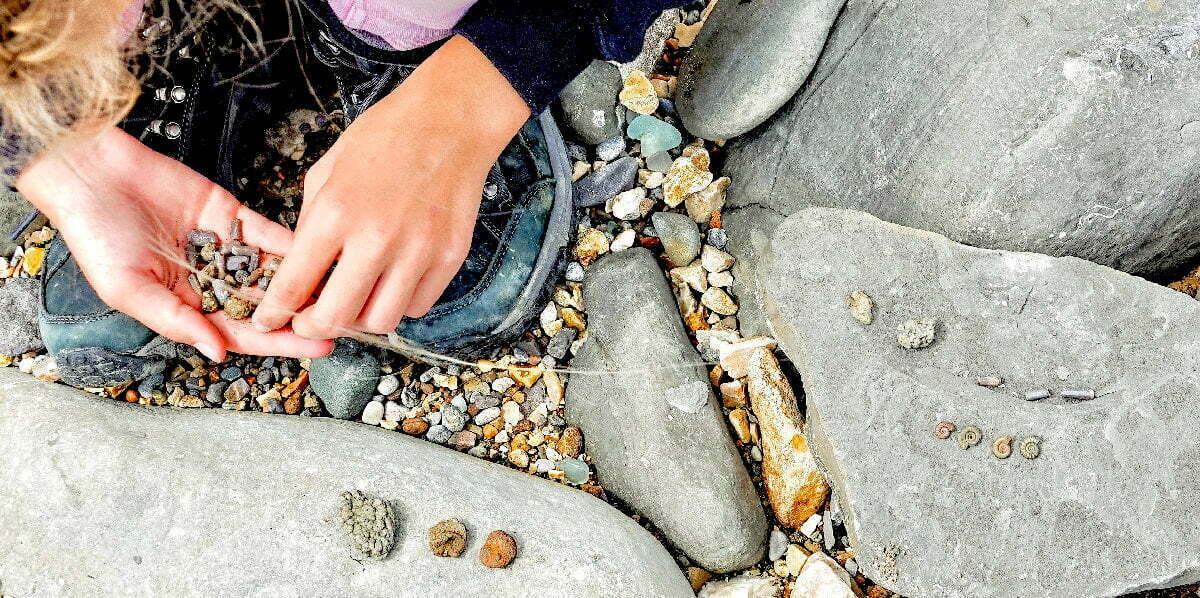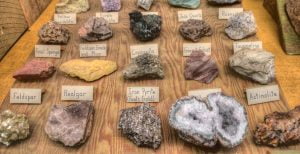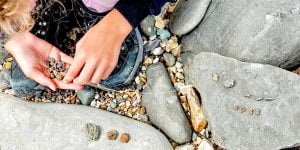
With Rock hunting or rockhounding being a popular pastime in the states, we caught up with some UK rockhounds to show us how it’s done and find out where can you find crystals in the UK?

Image: Jacob Boomsma/Shutterstock.com
Could rockhounding be the new hobby you have been looking for? If you have never heard of it, you could be forgiven… particularly if you live in the British Isles. For some reason, rockhounding never caught on here as much as it did in America.
Today, Five Minutes Spare are taking a closer look into Rockhounding with a UK based slant. What is it, how do you do it, and what’s the point in it? All will be revealed in this look into one of the most closeted hobbies on the market, even if we can’t reveal the best spots.
Let’s talk about rockhounding: what is it, where can you do it, and is it even legal? Let’s find out…
What is Rockhounding?
The term Rockhounding is most commonly used in the USA and describes the process of looking for rocks to try to make it sound cooler. Rockhounding is where you go out into the wilderness to look at geological areas of interest – and then you fill your backpack with the best bits.
There are lots of the ins and outs of it, but that’s the short version. There are things to take into consideration that seriously affect your ability to take up this hobby. Where you live, and the legality of hunting crystals in your area matters most. Check local laws before you decide to chip away at the nearest cliff. There’s also mobility and hardiness to consider.
Rockhounding takes someone mostly able-bodied, capable of carrying rocks a long way and wielding both a rock hammer and a shovel. This is not a hobby for the faint-hearted. However, if you think you have what it takes, and if you are determined to find your own crystals, then keep reading.
Is Rock Hunting Legal in the UK?
For clarity, rockhounding – or rock hunting – is in a bit of a legal grey area in the UK. This is down to the queen, who owns all the mineral rights to all the unowned land and some of the owned land. She owns all the gold in the ground, whether it has been found or not, which makes panning for gold in the UK somewhat problematic.
Don’t panic. The queen’s guards aren’t going to come out and arrest you for picking stones out of a ploughed field, but they might arrest you if you try to sell a gold nugget for 50k that you found in a forest.
Different Rock Hunting Rules For Different Places
So although legal, rockhounding is a bit murky in the UK. Land rights differ, too, from place to place. In Wales, many waterways and forests are protected by laws. In England, coastal erosion is a huge problem in some areas, and collecting is discouraged. In Scotland, though, all we have is rocks. The general attitude is that if you can find it, be bothered to get it out of the ground in the cold and the rain and lug it back down the mountain with you; then you can have it. But, again, if it is worth a lot of money, you will have to declare your find to the state.
You then have the landowners to worry about. If you show up with your gold pan and start digging up someone’s farm, there is a chance they’ll be mad at you. Always ask permission before collecting. A bottle of whisky goes a long way when acquiring permission. Let that be the top tip of the day.
Is rock hunting legal in the UK? Yes, but no, but yes, but don’t find anything too good, or they’ll take it off you. We hope this clears things up.
How do you hunt for Crystals?
To answer some of the more specific questions, we caught up with the expert rockhounds over at The Stone Circle in Scotland. They not only find all their own rocks and crystals for sale, they then hand polish them and add them to their store. At The Stone Circle, every gemstone, mineral, and crystal, can be traced back to the exact pile of dirt they picked it from…, so naturally, they were the best people to ask about what a rock hound actually does.
How do you hunt for crystals? According to the rockhounds at TSC, you just have to get out there and dig in.
“There’s bound to be a river or stream near you, and they are always good starting points. Get down to the banks when it’s running low and have a look at the pebbles. The closer you look, the bigger the differences are. If you look for long enough, you start to find crystals… It’s really that simple.”
But simple doesn’t mean easy. Rock hounds source their mineral specimens from all sorts of places. Some of the best involve climbing mountains and hills, wading in rivers, and trawling through beach stones on a regular basis. You need to be fit, have good eyesight, and know what you are looking for. You will get better in at least two out of these three areas if you persevere.
Where do you go Rock Hunting in the UK? and where can you find crystals in the UK?

Image: Goldsithney/Shutterstock.com
Although our friends at TSC were fairly quiet when we asked where their crystals came from, they consider many places to be good bets. So here are some of the best places to go rockhounding if you want to start looking for rocks as a new hobby…
[atkp_list id=’5302′ template=’grid_3_columns’][/atkp_list]
Cliffs and Rocky Outcrops
Another slightly more dangerous area to rock hound is your local rocky outcrop. Is there a disused quarry near you? Is there a field you pass that you always wonder about? A cliff you often pass that might have interesting rocks in there?
Admittedly, this isn’t the safest way to practise rock hunting in the UK. However, it might well be one of the best areas.
Reservoirs, Rivers, Streams and Ponds
Anywhere with moving water has the potential to contain quartz, jasper, and other minerals. If you have a good look in your local riverbed, you will almost definitely find a milky white-to-clear mineral. This is quartz, and we will talk more about that in a second.
Hills and Mountains
Last but not least, getting out into the mountains for a breath of fresh air is made better by a rock hunt. Going high means better quartz and the increased likelihood of other ethically sourced minerals.
A Note on Ethically Sourced Minerals
Before we cover the typical types of rocks you might find in the British landscape; we should talk about the importance of buying your crystals from an ethical source. Miners around the world work in terrifying conditions. They go physically underground with no safety equipment, no training in tunnel building, and usually with their children to help them out.
Conditions are so dangerous that we westerners wouldn’t send our pets down there… yet we consistently go online and buy these crystals for a fraction of their worth. We do this thinking we are supporting those miners. But, in fact, the opposite is true. Those miners work for a pittance, are paid a tuppence of what you pay for the specimen, and live hard lives right on the poverty line… all so that we can have a shiny rock for a small price.
Ethically sourced minerals mean traceability. If you come across a crystal shop claiming their minerals are ethically sourced, they should be able to tell you where each crystal came from. Not only that, they ought to know roughly who mined it and what they were paid for it. They should be able to point to the mine or region and say conclusively that it was bought from that place. If they can’t do this? That crystal is not ethically sourced.
Now that our small rant is out of the way let’s get to the good stuff. What are you looking for in the dirt, anyway?
What types of rocks and crystals do you find in the UK?
The UK is famous for a few minerals, actually. In Scotland, smoky quartz is so prevalent it has earned the name “Cairngorm Quartz”. Scottish agate is world-renowned for its fantastic lines, and jasper has been used in the crown jewels!
In England, you will find a type of fluorite so rare that it is only found in that one area. It is called “Blue John Flourite” and is now legally protected against thievery. The coasts sport fossils, and the rivers have trace amounts of gold. There is plenty of quartz in England, too.
Ireland has gold aplenty if you know how to pan for it. It is becoming popular with metal detectorists, as well as those who love geology. Jasper, quartz, and gold are the main rocks of Ireland.
Wales is another Celtic country that is filled with gold – but the law here has tightened recently to prevent an onslaught of panners. Fluorite, Azurite, and Linarite are all reported in Wales, which is almost as mineral-rich as Scotland is.
What to Look for when Rock Hunting?
Last but not least – we asked The Stone Circle team what it is that you are looking for when out hunting rocks. The answer? Anything out of the ordinary. Rocks that make you surprised have bold lines or crystal pockets and have striking colours. If you are hiking and see something interesting – pick it up and take it home. Google it when you have a minute to see what you have found.
Once you get the hang of it, we’re told it can become quite addictive. So maybe it will become your next hobby of choice? After all, if you can brave the rain, the wind, and the walking, you might just find something beautiful. TSC IG page is a testament to this.
Enjoy this content?






[…] Agate crystals are beautiful and unique. They can be found in many different places across the United Kingdom. Here are some of the best places to find them while out rock hounding: […]
[…] for Abington, then for Leadhills, and then for Wanlockhead. Wanlockhead is a favourite place for gold panners and plays host to the Gold Panning Association’s annual competition. Drive through the beautiful […]